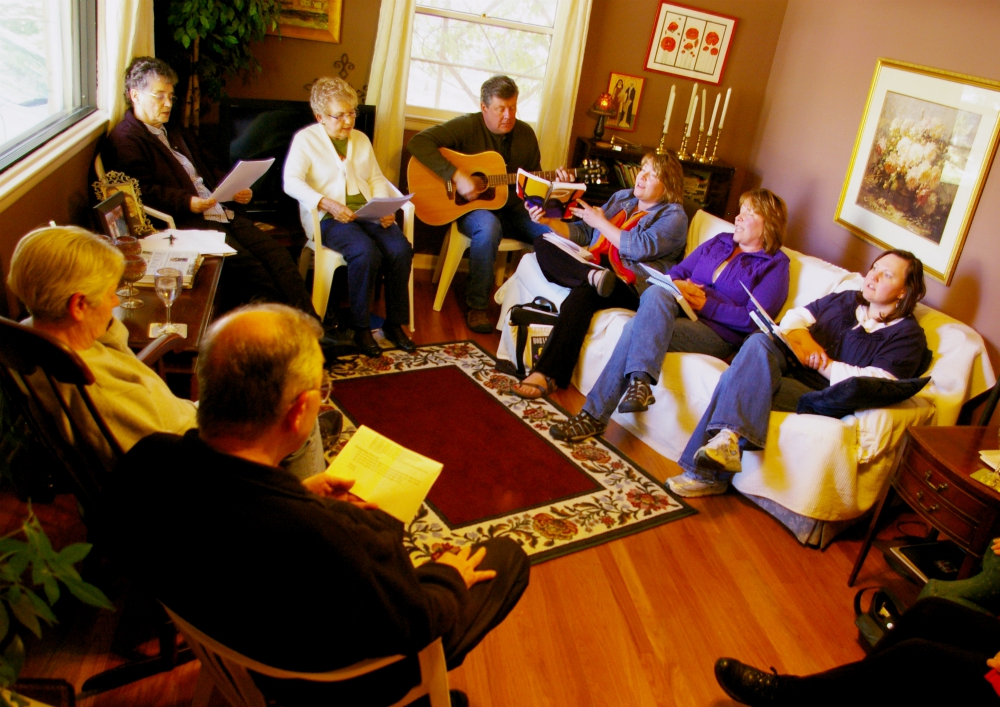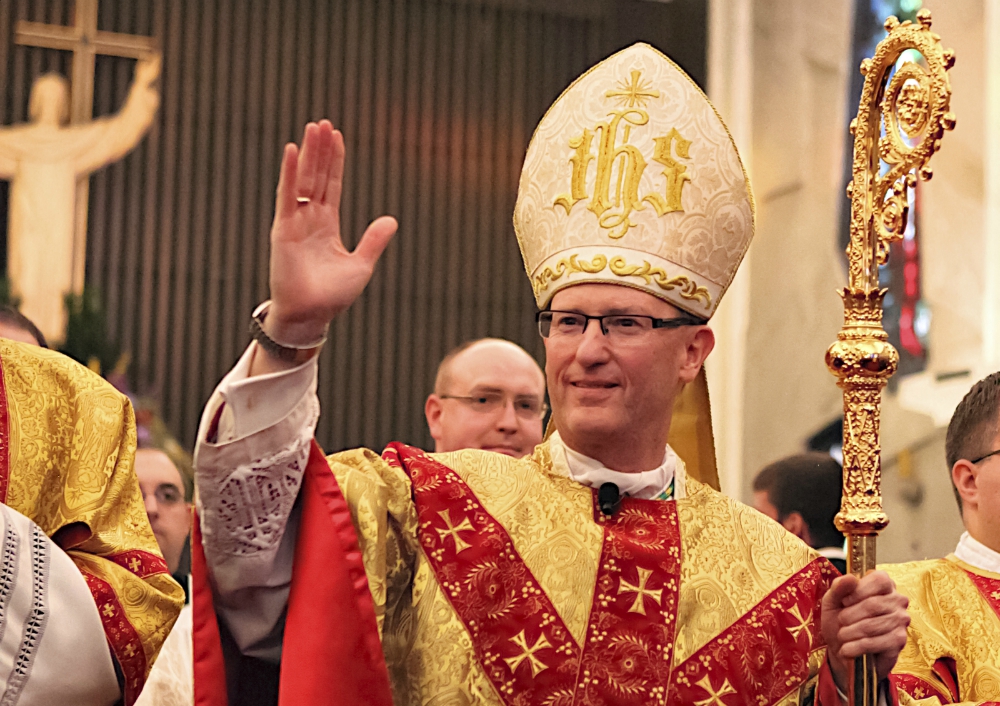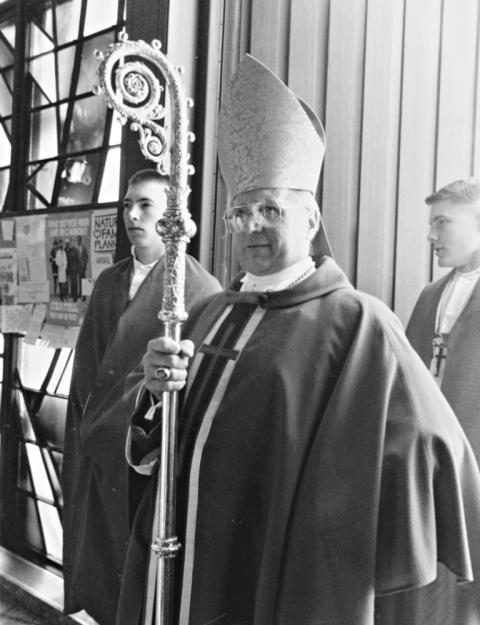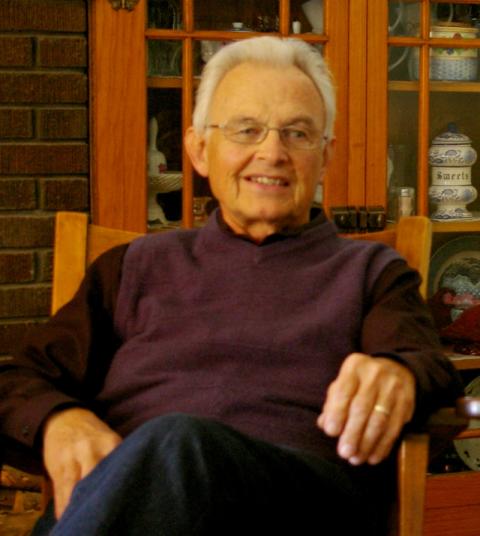
Members of the Call to Action group in Lincoln, Nebraska, sing in a prayer liturgy during a 2012 meeting at the home of Rachel Pokora. (NCR photo/Joshua J. McElwee)
Nearly 22 years after area Catholics were excommunicated for their membership in a national church reform group, the bishop of Lincoln, Nebraska, has proposed a way to end their censure and return them to full communion with the church.
In late 2017, after more than a year of dialogue with several members of the local chapter of Call to Action, Lincoln Bishop James Conley extended an offer to lift the excommunication of its members on an individual basis while leaving the decree in place against membership in the organization.
Conley, who in November 2012 became bishop of the southeastern Nebraska diocese, 16 years after the excommunication, wrote in a Dec. 12 letter to Call to Action Nebraska members, "I have been clear from the beginning that no Catholic should become a member of Call to Action. I believe it poses a danger to the faith.
"However, I am willing to consider rescinding the excommunication in individual instances where members, currently not prepared to leave CTA, reaffirm their commitment to the full teachings of the Catholic Church," he said.
The proposal emerged through a series of dialogue sessions that began in the fall of 2016 among Conley, two diocesan officials, and five women of Call to Action.
"I'm very, very pleased with the understanding that we reached together as a group," Rachel Pokora, one of the dialoguers, told NCR.
Fr. Daniel Rayer, chancellor for the diocese, told NCR that the bishop has no comment at this time, and that he wants to let the process unfold organically.
At this point, it is unclear how many people are covered by the 1996 excommunication — its enforcement limited to the Lincoln diocesan boundaries — or how many from Call to Action plan to accept the bishop's offer, which they learned of shortly before Christmas. A year after the order, the group had 60 members. There remain some who have never accepted the excommunication as valid. Even more view it as an injustice.
In May 1996, Conley's predecessor Bishop Fabian Bruskewitz issued the blanket excommunication decree to all members of Call to Action, both the national and local groups, as well as those of 10 other organizations, including Planned Parenthood and the Freemasons, all of which he deemed "perilous" to the Catholic faith. Absolution from the order, Bruskewitz said, was reserved for the bishop.
The move by Bruskewitz, coming several months after the local Call to Action chapter formed, drew widespread media attention, including on the CBS newsmagazine "60 Minutes." An appeal to the Vatican in 2006 failed to have the excommunication overturned.
From the archives: A year after the excommunication order, "Dueling Catholic conferences enliven Lincoln" (NCR, May 30, 1997)
Excommunication is the severest censure for Catholics under canon law and bars an individual from the sacraments, including receiving the Eucharist, and from holding ministerial roles. While an excommunicated person is not kicked out of the church, they are considered outside full communion.
No other U.S. bishop followed Bruskewitz's lead in barring Call to Action from their dioceses.
Formed in Chicago in the late 1970s before expanding nationally in 1990, Call to Action seeks structural change in the church around the issues of justice and building inclusive communities. It has advocated for women's ordination, LGBT rights, racial justice and increased lay involvement. It currently has 25,000 supporters, according to its website.
In his letter, a copy of which NCR obtained, Conley does not mention any of the other 10 organizations involved in the excommunication.
The 62-year-old bishop was clear that he would not overturn the excommunication legislation — a request of the women who met with him in conversations since September 2016 — because of concerns with positions held by the national Call to Action. But he acknowledged the "honest and sincere dialogue" with its members, which he said led him to understand that not everyone accepts all positions held by the national office.
The process outlined by the bishop would have Call to Action members meet with him at a community meeting room, where they would discuss the excommunication. Afterward, those who wished to remain in the organization but have the excommunication rescinded would together, along with the bishop, profess the Nicene Creed and the Easter Vigil affirmation of faith.

Bishop James Conley blesses the faithful Nov. 20, 2012, as he leaves the Cathedral of the Risen Christ in Lincoln, Nebraska, after his installation as bishop of Lincoln. (CNS/Southern Nebraska Register/Courtesy of Kevin Clark)
By doing so, those members would be "thereby affirming the Catholic faith as received by the Catholic Church and rejecting positions held by Call to Action that are contrary to received Catholic doctrine," Conley said.
Call to Action Nebraska members said that, during their dialogue with the bishop, there was mutual understanding that no one would be required to reject certain positions. But they also understood there are stances he'd prefer they not support, such as on women's ordination and LGBT rights. To address that, they agreed to "live in that tension," said Patty Hawk, a past national Call to Action co-president who participated in the dialogue.
"The 'tension' describes how we agreed to work for better understanding and respect one another in our convictions," she told NCR.
While no date or location for the meeting with Conley has been determined, it is believed it will not take place until February at the earliest. One thing is certain: The experience will be communal.
"We were excommunicated as a community, we want this to end as a community," Hawk said.
Five sessions, 16 months
The bishop's offer developed from conversations with the five members of Call to Action Nebraska that spanned five sessions and 16 months.
Those dialogue sessions included Conley; judicial vicar Msgr. Mark Huber; J.D. Flynn, former special assistant to the bishop and director of diocesan communications who in August was named editor-in-chief of Catholic News Agency; and, from Call to Action, Joan Johnson, Nancy Lueking, Carol McShane, Pokora and Hawk.
Advertisement
The dialogue was kept secret, with participants agreeing not to disclose the details while the process played out, and only the Call to Action Nebraska board aware it was occurring.
The first meeting, in September 2016, came in the waning months of the Jubilee Year of Mercy (Dec. 8, 2015-Nov. 20, 2016). At the onset of the Year of Mercy, Conley issued a decree permitting priests to remit the excommunication censure for members of the forbidden organizations who renounced their membership.
While several Call to Action members entered the dialogue hoping the excommunication would be completely lifted, they arrived with few expectations. When Pokora had met with Conley in 2013 to share her book on the excommunication, the new bishop was insistent that leaving Call to Action be a requirement to rescind the excommunication.
The dialogue with Call to Action members, held in the library at the chancery, began with each person describing their faith journey before eventually delving into the excommunication and its impact. According to several Call to Action members, the bishop said that for him to understand the excommunication, he first had to get to know them.
"I think everybody was honest, sometimes painfully so," said Hawk, adding, "There was a lot of grief that had been building up for an awfully long time."
The candid sessions were filled with tears and, at times, raised voices, but remained respectful, open and dynamic, the Call to Action members said.
"We were honest, forthright, vulnerable, emotional, challenging and challenged. And sometimes it wasn't obvious that we were making any progress at all," said McShane, whose own one-on-one conversations with Conley following her husband's death in 2013 served as one of the catalysts to the wider dialogue.
In that group setting, McShane shared how the excommunication left many members feeling hurt, ostracized and condemned as individuals and as a community. "Like Nathaniel Hawthorne's book The Scarlet Letter, it's felt like a big E is tattooed on our foreheads," she told NCR.
"We kept hoping that the rest of the church would rescue us," McShane added.
Pokora said that in some ways, she has not acknowledged the excommunication because she never felt separated from the church in her heart and soul. But she also described being denied the Eucharist by a priest she respected, and how she could not marry in the church a year and a half ago.
"So even if I have chosen to not acknowledge it, it has impacted my life and it's been painful," she told NCR.
As each of the Call to Action members revisited their own painful experiences, they watched the bishop sitting silently and listening intently.
"We were surprised at how willing he was to hear our side," said Lueking, current president of Call to Action Nebraska.

Bishop Fabian Bruskewitz in 1996 (NCR photo/Leslie Wirpsa)
That Conley met with them as a group and listened carefully represented a dramatic shift from Call to Action Nebraska's interactions with Bruskewitz. At the time the excommunication decree was proposed, the now-retired bishop, who continues to live in Lincoln, insisted on meeting one-on-one with members of the group, and later refused to meet with them. Their few encounters were often heated and contentious.
"Sometimes tense, sometimes intimidating, sometimes confusing," James McShane told NCR in April 1996.
Hawk said she had the sense that Conley was surprised that "we are as committed and as knowledgeable as Catholics as we are. I mean, these well-educated, enduring Catholics — who would stick around this long in an excommunication if they weren't?"
It wasn't until the third meeting, in March 2017, that the proposal for rescinding the excommunication was first broached. More serious discussion followed at the fourth in terms of what the process would be and what would be included. The final meeting was held Dec. 12, the same date on the bishop's letter.
The Call to Action representatives were insistent that their members would not end support of certain issues. It was Conley, they said, who broached the idea of living with the tension, in that they believed the church would change its teachings on issues like women's ordination and same-sex marriage, while he does not.
Hawk said the dialogue process left her impressed by Conley's willingness to change, not on church doctrine, "but rather in what it takes to be in complicated relationships." While the women initially hoped the excommunication would simply end, they now say the dialogue process was necessary at a relational level to address the pain it brought.
"I think that every single person in that room was changed by the dialogue," said Pokora, who echoed others in sensing the Holy Spirit at work in the sessions. "That we all had deeper understanding, and that it really was an amazing example of how we can engage impasse and confront difference in a way that is loving that can be really life-changing."
To reach a point of finding common ground amid strong disagreement on certain positions was not easy, McShane added, and it took "stripped-bare sincerity and a strong desire."
"I don't know how some of these things got resolved, but they did. So I'm changed. I guess I assume less and I trust more," she said.
Leaving the censure in place
An Epiphany celebration and potluck Jan. 7 presented Call to Action members their first opportunity to discuss the proposal together and learn of the process that led to it.
Nineteen people attended, not all of whom were impacted by the excommunication. There were questions about the dialogue sessions and about the logistics of how the meeting would play out.
"At this point, it's time for each person who's been impacted by the excommunication to really pray about and think about and discern whether or not he or she would like to accept the bishop's offer to end their excommunication," said Pokora, who plans to partake in the proposed meeting.
For some, the decision to take the offer would validate an excommunication decree that they have long held was invalid from the beginning — a position supported by canon law expert Fr. James Coriden — and violated their due process.

John Krejci (NCR photo/Joshua J. McElwee)
"If you don't accept the excommunication, there's no need to be absolved of it or to come to any dialogue about it," said John Krejci, who served as co-chair of Call to Action Nebraska at the time of the excommunication.
Another point repeatedly raised during the Epiphany discussion was why couldn't the bishop just overturn the legislation outright?
Oblate Fr. Francis Morrisey, professor emeritus of canon law at St. Paul University in Ottawa, Canada, said a profession of faith, such as in the form of the Nicene Creed, is normal procedure for rescinding an excommunication. He called it a "great gesture" by Conley not to force members to leave Call to Action as a condition of ending the order.
The process of dialogue that led to the proposal, he added, reflects the pastoral approach called for by Pope Francis.
"Francis is saying you start with the people. Before, we said we start with the principle, and there's a big, big difference," said Morrisey, who in 2014 was appointed to a special Vatican commission to review matrimonial processes in canon law.
Leaving the censure in place means that new members of Call to Action Nebraska will still be excommunicated upon joining. Conley told the women that in those cases, the person could meet with him and go through a similar process to the communal experience. The bishop in his letters said he would also meet with individuals who did not attend the group meeting.
As for members who have died, McShane said Conley told her that her husband, James, could be buried in Catholic grounds, as could other deceased members.
While Krejci commends the women for their work to bring forth the proposal, which he called "not unreasonable," he said he and his wife are not interested in participating in the group meeting. They may, however, attempt to meet with the bishop at a later date.
No poll was taken at the Call to Action meeting about who was considering accepting the proposal. Still, those who met with the bishop encouraged the others to at least attend the meeting with him.
"Even if they do come to the event, they don't have to say the Nicene Creed, and they don't have to participate in that part of it if they don't want to. But I hope they will participate in the dialogue with the bishop," Hawk said.
[Brian Roewe is an NCR staff writer. His email address is broewe@ncronline.org. Follow him on Twitter: @BrianRoewe.]







